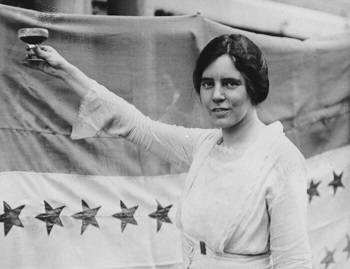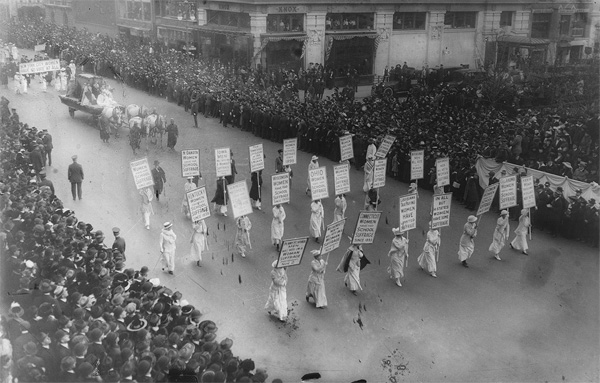 |
| Alice Paul (Library of Congress) |
A little girl in the late nineteenth century once had a big dream for her future. She was dreaming of going to college, studying science, and voting one day. However, because she was a woman, voting was out of the question. This girl's name was Alice Paul, and she would grow up to ensure that every woman in the United States would be able to vote. On January 11, 1885 in New Jersey, Alice Paul was born into a Quaker family that encouraged her to stand up for her beliefs and to think of all people as equals (Mendoza). When she was older, Alice Paul attended Swarthmore College wanting to work in the new field of social science (Fry). Soon after, she went to London, and she realized that she had a desire to have equal rights with men, which did not exist at the time. She wanted to vote but was unable to, so she focused on the women's suffrage movement in order to achieve her goals. After returning from London with a new ally, Lucy Burns, Alice Paul went to great lengths to ensure that women would have fair treatment for centuries to come. Some of those lengths included organizing numerous pickets. To picket was to stand silently in a public area, such as in front of the White House, with a banner covered with propaganda slogans for hours. Because of Paul's acts of bravery and sacrifice, women gained the right to vote in 1920. A hero must be courageous when no one else will. A hero must will step up to the challenge instead of backing down. A hero must defy authority, their enemies, and their peers; they know to do so even when they are terrified. Finally, a hero must make sacrifices to make sure others will have a better future. By this definition, Alice Paul proved she was a hero by demonstrating she had the courage to stand up for herself and a willingness to make sacrifices for the betterment of others.
 |
| Women's Suffrage Parade (Library of Congress) |
Alice Paul showed her courage when she stood up for herself and others, even though she knew she would be punished for her assertiveness. For instance, after Paul won the vote, she articulated why she was so compelled to fight for the rights of all American women (Mendoza). She said, "... women 'probably are going to do a lot of things that I wish they wouldn't do; but it seems to me that it isn't our business, to say what they should do with it [their liberty]. It is our business to see that they are free'"(qtd. in Mendoza). Paul believed that both men and women should be able to do what they want with their freedom, no matter what their peers think. She also did not want other people's opinions to be oppressed because of their gender. She had the idea that no one should have the power to silence a fellow human being's thoughts and emotions about topics which impacted their daily lives. Paul showed courage because she openly and actively supported her beliefs, even when there were naysayers. Instead of retreating before she put her reputation in jeopardy, she stood up for those who did not know how to stand up for themselves. However, Paul did not only stand up for her inferiors. She also valiantly fought the ideas of her fellow suffragists, whom she deemed too conservative; she broke off from their organization so she could employ new and more radical strategies (Fry). One such strategy was this: "On January 11, 1917, the first militants took up their positions around the White House, where they stayed from 10 a.m. to 5 p.m. five days a week, ignoring rain, snow, and sleet. Their placards, mounted on three-foot wooden boards, were clear enough: 'Mr. Wilson: You promise democracy for the World and Half the Population of the United States cannot vote. America is not a democracy'"(Baker). Alice Paul was courageous to both organize a protest that her peers thought too radical and to stand for hours in harsh weather conditions, knowing she would be assaulted by anti-suffragist onlookers and eventually be arrested. She believed that to make the world a better place, she had to defy authority and take a stand on what she believed. During her time, a simple, peaceful protest was enough to land a suffragist in prison or a mental institution, making her acts of protest even more brave. In the face of all odds, Alice Paul had courage when others had none, the mark of a true hero.
Alice Paul was known for the sacrifices she made in order to achieve her goal of suffrage and complete political equality. For example, Paul was perpetually moving in and out of prison because of political reasons. Picketing was a perfectly legal form of peaceful protesting, but anti-suffragists were able to get away with throwing suffragists into prison and torturing them on the charge of "obstruction of traffic"(Bausum). "In a political climate increasingly intolerant of dissent, the suffragists were harassed, physically assaulted, and then arrested. Paul herself was arrested in October. Sent to the Occoquan Workhouse in Virginia, she was placed in solitary confinement"(Fry). Even though Alice Paul knew she would be arrested and tortured for taking such a radical stance on women's suffrage, she fought anyway. When she was eventually arrested, she went on a hunger strike. In response, she was force-fed by having raw eggs shoved down her nostril with a tube, but she still would not give up her strike (Bausum). This was both "dangerous and humiliating"(Fry). She believed that no one should be thrown into prison for voicing their opinions peacefully, so she made herself a martyr for suffragists everywhere. She sacrificed her own health and well being to make sure women would be able to vote, something that very few people would do. However, the sacrifices she made in her fight for women's suffrage were not the only sacrifices she made in her life. She dedicated her entire life to achieving total political equality, and worked until she died late in life. Amelia Fry stated,"Although some suffragists dropped out of politics after 1920, [Alice] Paul entered phase two of her political career: securing passage of a federal equal rights amendment to the U.S. Constitution to complete women's legal equality"(Fry).
Once women's suffrage was achieved, Paul she dedicated the rest of her life to achieving total political equality with men. She continued fighting until she was 92; even near the end of her life, Paul was still involved in politics and earning complete equality as ever. This includes helping pass multiple acts, drafting up the Equal Rights Amendment, and creating charms commemorating the courage of women's rights activists (Graddy). She sacrificed her retirement and dedicated her entire life to helping women in the U.S. live better lives. She could have enjoyed the last decades of her life without working, but she sacrificed that time in order to benefit the masses. In the end, Paul was a hero partly because she made major sacrifices for the well being of all American women, including her own health, free time, retirement, and well-being
All in all, Alice Paul showed heroism by having the courage to protect her inferiors while challenging her peers, and by sacrificing herself for the greater good. She fought her enemies with words, questioned the modern suffrage strategies, and eventually was punished for her radical new beliefs. She gave up her good health and her freedom for her cause. She was a martyr, empowering other women to fight harder because of her hellish treatment in jail. Even after she won the vote, she kept advocating for women's rights well after when most would have retired. She was an inspiration because she fought hard for her entire life, even when others would give up. Her hard work also paid off, since she managed to pass the amendment necessary for full suffrage and was involved in passing multiple acts afterwards (Fry). During her entire life, she never aimed for glory or fame, only wanting to achieve her goal of making the world a better place. "Her militancy in the fight for woman suffrage" was also a major reason in why she was an inspiration ("Paul, Alice"). Most people, including myself, would have shied away at the thought of organizing massive peaceful protests and being tortured in prison, but Alice Paul took up the challenge. Her bravery and sacrifice were what made her a real life heroine.
Works Cited
Baker, Jean H. "1919: placards at the White House: fed up with the inaction of conservative
suffragists, Alice Paul decided on the highly unorthodox strategy of pressuring the president."
American Heritage Winter 2010: 74+. Biography in Context. Web. 1 May 2016.
Fry, Amelia Roberts. "PAUL, Alice." Notable American Women, A Biographical Dictionary:
Completing The Twentieth Century (Vol.5) (2004): 500. Biography Reference Center. Web. 28
Apr. 2016.
Graddy, Lisa Kathleen. "Alice Paul: Champion of Women's Suffrage." O Say Can You See? Ed.
Rebecca Kokinda. Smithsonian, 8 May 2012. Web. 2 May 2016.
.
Mendoza, Jessica. "Alice Paul: How her Quaker roots shaped her gender activism." Christian
Science Monitor 11 Jan. 2016. Biography in Context. Web. 1 May 2016
"Paul, Alice." Britannica Biographies (2012): 1. Biography Reference Center. Web. 28 Apr.
2016.
Bausum, Ann. With Courage and Cloth: Winning the Fight for a Woman's Right to Vote.
Washington D.C.: National Geographic, 2004. Print.
Page created on 5/27/2016 12:00:00 AM
Last edited 12/9/2024 2:30:59 PM
